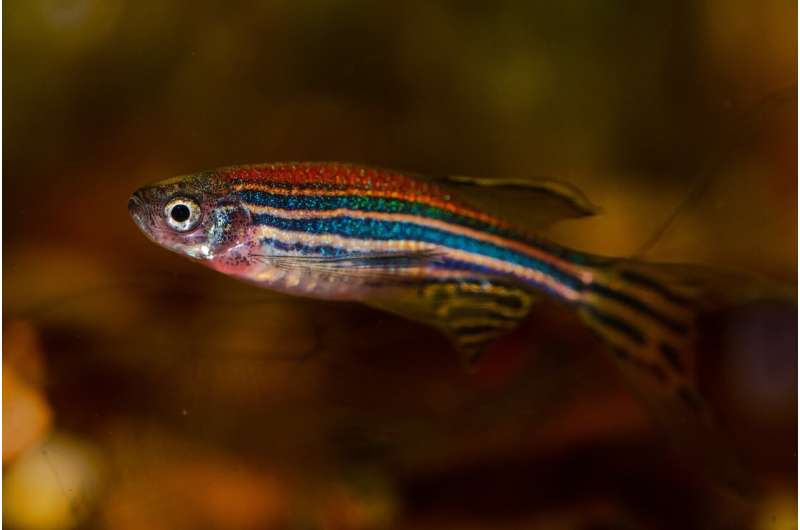
[ad_1]

Credit: Pixabay/CC0 Public Domain
A recent study found that fish exposed briefly to very low concentrations of certain pesticides can show long-lasting behavioral changes, with effects reaching offspring that were never exposed before.
These findings are of concern not only for fish but also for all vertebrates that are commonly consumed. PesticidesStudy co-author Suzanne Brander, an associate professor and ecologist at Oregon State University’s Hatfield Marine Science Center, said the study also involved humans.
“This exposure isn’t just happening to these fish, it’s happening to everyone. Aquatic Biology in areas that flow through human-populated areas,” Brander said. “It’s safe to say we’re seeing the effects. Population level If fish that have been exposed for a few days as embryos and larvae are producing offspring that are developmentally impaired, or males that are not able to produce as much sperm.”
Climate change is also expanding the geographic range of many insect species, resulting in increased use of pesticides in both agricultural and residential settings, and the potential for more organisms to be exposed to harmful chemicals. is increasing.
the study, published In the journal Environmental Science and Technologyused the domestic Silversides as a model. Fish species Common in North American estuaries and marine waterways, with particular emphasis on San Francisco Bay and the Sacramento-Joaquin Delta.
OSU researchers chose three commonly used pyrethroid insecticides (bifenthrin, cyfluthrin and cyhalothrin) because of their high neurotoxicity and persistent presence in Bay Delta waters. These pesticides are also widely used and detected throughout the country.
For the experiment, researchers exposed silverside embryos to various pesticides for 96 hours, at a concentration of 1 nanogram of pesticide per liter of water. That’s about a teaspoon of pesticide in an Olympic-sized swimming pool, Brander said.
After 96 hours, the fish larvae were placed in clean water and reared until they were five weeks after hatching. They are then kept in large tanks until they reach reproductive maturity at about eight months of age. At that time, the researchers gave birth to adult fish and collected their offspring for rearing in clean water. Behavioral responses were measured in larval parents as well as larval offspring.
The researchers found that the fish that were originally exposed to the pesticide exhibited hypoactive behavior, or decreased activity. Larval stagedue to which they cannot search for food as well as the control group, if they were in the wild.
In contrast, the second generation of fish—the generation that was never exposed to pesticides, except for their parents—exhibited highly active behavior, swimming more and being more active than controls. The researchers speculate that this was a compensatory response to the hypoactive behavior of the previous generation.
The tests also showed that adult male fish are more exposed to bifenthrin and cyhalothrin because the larvae have smaller gonads than the gonads. Control groupWhile the second generation had increased fecundity.
While much research has focused on zebrafish as a model. Human healthMany fish species share a large portion of their genes with humans, Brander says, and thus can be used as models for predicting how humans might respond to a chemical. .
“This study is another demonstration of how exposure to these chemicals early in life can affect fish for months and, in the case of humans, potentially for years,” Brander said.
“We could potentially use this as a model for how human babies or humans in utero might respond to these chemicals—fish use the same hormone receptors as we do; the same steroids. So any A substance that interferes with reproduction in fish could potentially have the same effect on humans.”
Brander said the results suggest the fish were able to adapt to exposure in some ways, but may be overcompensating, and such changes cost success in other biological processes such as growth or hunting. But can come.
“In terms of environmental regulation, if we impose strict controls because of studies like this, it will take a few species of fish — or whatever — to fully recover,” he said. “
The study’s lead author was OSU doctoral student Sarah Hutton, who graduated last year and now works in environmental consulting.
More information:
Sarah J. Hutton et al., Multigenerational, Indirect Exposure to Pyrethroids Reveals Possible Compensatory Responses and Reduced Toxicity to High Salinity in Estuarine Fish, p. Environmental Science and Technology (2024). DOI: 10.1021/acs.est.3c06234
Provided by
Oregon State University
Reference: Even very low levels of pesticide exposure can affect fish for generations, study finds (2024, February 20) Accessed February 20, 2024 at https://phys.org/news/2024-02-pesticide- .html retrieved from exposure-affect-fish-generations
This document is subject to copyright. No part may be reproduced without written permission, except for any fair dealing for the purpose of private study or research. The content is provided for informational purposes only.
[ad_2]
